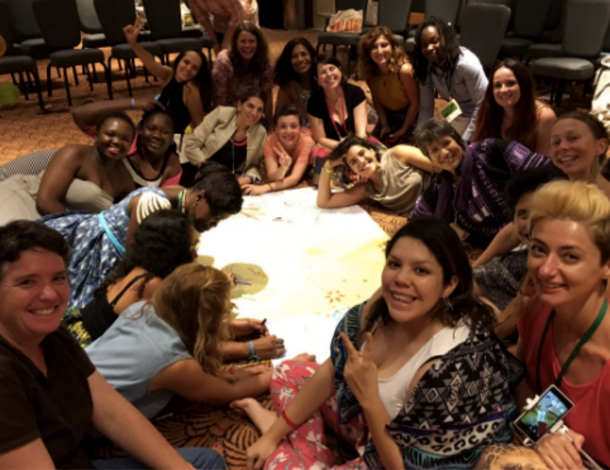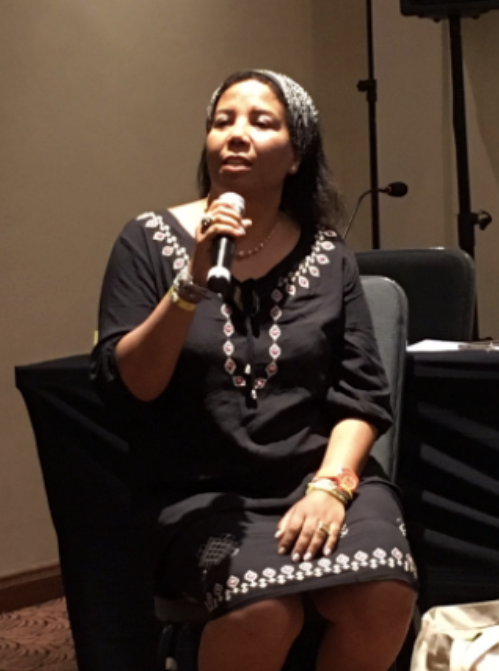The Women Human Rights Defenders Hub at the AWID Forum was many things that are beautiful, informative, and challenging. Bringing to the same space women, trans* and intersex activists working in different parts of the world, we all had the opportunity to collectively reflect on challenges, unite in healing power and exchange strategies. It was a one of a kind opportunity for committed and fierce women, trans* and intersex activists in acknowledging each other’s strength in the struggle for healing justice.
Trauma and Healing
The Hub cultivated several discussions on the role of trauma and healing in our activisms. Providing the space for ongoing wellness and self care practices, participants had the opportunity to learn different techniques, let go of tension and confront trauma in a healing manner. From tai chi,massage and yoga, the Hub hosted a diverse portfolio of concrete techniques all activists could learn from and implement while confronting injustices. It was obvious during the 13th AWID Forum we can’t pour from an empty cup, and that we have to take care of ourselves if we want to take care of others.
One informative and useful practice introduced at the Hub was Afrikan Yoga (Smai Tawi). A participant who practiced Smai Tawi explained “It is a form of yoga known for its use of imagination and rhythmic elemental movements, and so very soon we found ourselves flying like birds, through the power of our imagination.”

The space also hosted in-depth conversations on collective wellbeing. Led by several activists from different regions, “Sustainability of feminist activism - Inter-regional dialogues on self-care and collective well-being” was a safe healing space where practices and strategies were exchanged. The discussions were centered on why we needed well being in our organisations and movements, what groups were doing in different continents from trauma healing, to bodywork treatments, use of herbs and group healing and exercises like yoga and movement.. Similarly, the session entitled “Cultivating wellbeing: Provocative feminist thinking and action on trauma and protection” hosted by AIR for Africa and SISMA Mujer from Colombia portrayed two different experiences in practicing healing justice for displaced women in civil war contexts in South America and in Africa.
To unite in healing justice, activists from Armenia and Turkey held the sesión entitled “An Applied Example: Trust Building among Women via Non-Verbal Communication Methods”. The session demonstrated it is not only words that unite us in solidarity but also our bodies. Facilitators brought together an audience who, largely for the first time met each other, and used movement to build trust and solidarity between women, trans*, and intersex activists working on a diverse range of issues. To get a sense of the results, love and trust built through movement and art just check out the smiles in this photo from the session.
Cross movement solidarity building
The Hub also brought together activists from Meso America and Middle East and North Africa (MENA) to exchange experiences on coalition building. Activists from different regions agreed coalition building is an effective strategy in responding to increasing violence and restrictions.
A participant from MENA expressed “Thanks to this space, I feel I am not alone, and I have friends in far away places who will support me in my time of need.”

The Mesoamerican Initiative of Women Human Rights Defenders (IM-Defensoras), and the MENA WHRD Coalition held respective sessions in which they shared their challenges in confronting violent states and non-state actors, lessons they have learned about strengthening internal coalition processes and their needs and demands from the international community in solidarity building.
One of the participants who shared with us her experience was the fierce Azza Soliman of Egypt. Founder of Center for Egyptian Women’s Legal Assistance (CEWLA) and a member to the WRHD MENA Coalition, Azza was persecuted because she was a witness to the murder of activist Shaimaa ElSabbagh, who was killed by security officials during a peaceful protest in Egypt on 24 January 2015. Shortly after the event, the Qasr El Nile Prosecution Office in Cairo changed Ms Soliman’s status from a witness to the incident and charged her with illegally protesting. She was acquitted of all charges in a legal fight that went close to a year. She shared the important role cross movement solidarity played in pressuring the Egyptian government to stop their judicial persecution of her and drop all charges. At the time we didn’t know that Azza will face judicial harassment soon again.
During the IM-D meeting the many members that were panelists in the session shared different realities and risk facing WHRDs in the region. For example Juanita Jiménez from Nicaragua shared how the feminist movement in Nicaragua is under the constant attack of the current President Daniel Ortega in a dictatorship that uses institutionalization as a way to attack and criminalize WHRDs on a daily basis. She said: “Defending rights in Nicaragua places us at constant risk of receiving attacks and to ban our work”
At the regional level in Mesoamerica the IM-Defensoras represents an important force as a mechanism that has allowed WHRDs to strengthen our identities as WHRDs, and face the attacks and criminalization received.
The session on WHRDs Confronting Extractives brought together activists and leaders from Asia, Africa and South America who stand up to corporate power in defense of their lands, communities, and the environment. Despite the differences in geographical locations and industries involved, the types of harassment and intimidation facing WHRDs are shockingly similar. Such risks include physical threats and intimidation, including gendered attacks, against themselves and their families. It was evident from the session that States are more interested in protecting corporate interests over that of their citizens and local communities all in the pursuit of profit-driven and destructive development projects. The session also reaffirmed the need to act as a global community in responding to risks, threats and violations faced by activists confronting corporate power, and to find new tools to address corporate impunity.
Strengthening bonds and forming new ones
The Hub brought together activists of all ages and working on multiple interconnected struggles. A young feminist activist shared“I don’t have the resources or access to unite with so many inspiring individuals confronting the most severe forms of injustices. This will be forever etched in my memory.” We were all energised through collective power and ultimate respect for each others struggles.
For example the Russian-speaking activists' networking meeting was a unique informal get-together, with more than 30 people present from Ukraine, Kyrgyzstan, Georgia, Lithuania and more. This was a space to share stories and celebrate the complexity of gender, ethnic and national identities and histories in each participant’s struggles. A participant to this event expressed “We appreciated the diversity of our spheres of engagement: feminism, ecology, LGBT rights, women with disabilities, sex workers, right of people living with HIV, drug policy, resource mobilization, peace-building, arts and more. Central Asia, Caucasus and Eastern Europe should definitely become more visible on the global feminist map! “
Appreciating the Opportunity to Get Together and Unite in Healing Power
The WHRD Hub space was an indication of how women, trans* and intersex activists need more opportunities and resources for get together. Bringing together all who experienced gender specific consequences by virtue of their identity and their work, we unite in healing justice, grow by learning from others experiences and make new bonds that result in fruitful partnerships and exchanges and stronger global networks of solidarity.
